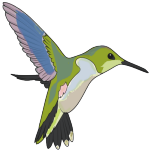Helping Paws for a Youngster with Cerebral Palsy
The touching true story of an assistance dog who becomes a special friend for a young girl with cerebral palsy.
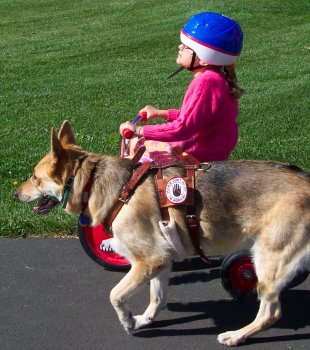 Eight-year-old
Cecily was born prematurely, and as a result, lives with Cerebral Palsy.
She has trouble with balance, walking long distances, and picking up dropped
items. Other than that, she is just like every other young girl. She likes
to read, laugh, play with her brothers and sisters, help take care of
new baby brother, and go to the park. However, she has never been able
to be 'just like every other young girl' because she is not always accepted
by her peers, and certainly not able to keep up with their play. Her family
is wonderful, and her siblings supportive and inclusive. Still, she often
yearned for her own 'special friend'. She knew, even at her young age,
that she was 'different'. And she was painfully aware that the things
that made her different also put up a barrier between her and other children
her age. With a wisdom that comes only from 'being there', she also knew
that those 'differences' were not going away. Still, she wished there
was some way those differences could attract positive attention rather
than negative.
Eight-year-old
Cecily was born prematurely, and as a result, lives with Cerebral Palsy.
She has trouble with balance, walking long distances, and picking up dropped
items. Other than that, she is just like every other young girl. She likes
to read, laugh, play with her brothers and sisters, help take care of
new baby brother, and go to the park. However, she has never been able
to be 'just like every other young girl' because she is not always accepted
by her peers, and certainly not able to keep up with their play. Her family
is wonderful, and her siblings supportive and inclusive. Still, she often
yearned for her own 'special friend'. She knew, even at her young age,
that she was 'different'. And she was painfully aware that the things
that made her different also put up a barrier between her and other children
her age. With a wisdom that comes only from 'being there', she also knew
that those 'differences' were not going away. Still, she wished there
was some way those differences could attract positive attention rather
than negative.
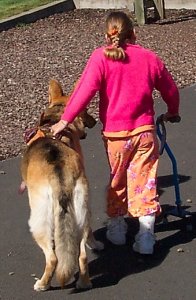 In
addition to the social and emotional challenges Cecily lives with, she
also has to rely on others to help her with just about everything physical.
Somebody needs to be close by at all times in case she falls. She needs
someone to retrieve a forgotten crutch, or pick up her crayon if she drops
it; she can't go into the bathroom by herself because her balance is so
bad. It is an extra challenge for everyone, although they love her and
love helping. And it was most especially hard on Cecily's own self-esteem.
Even a six-year-old wants to be able to go to the bathroom by herself,
or pick up her own crayon to keep coloring.
In
addition to the social and emotional challenges Cecily lives with, she
also has to rely on others to help her with just about everything physical.
Somebody needs to be close by at all times in case she falls. She needs
someone to retrieve a forgotten crutch, or pick up her crayon if she drops
it; she can't go into the bathroom by herself because her balance is so
bad. It is an extra challenge for everyone, although they love her and
love helping. And it was most especially hard on Cecily's own self-esteem.
Even a six-year-old wants to be able to go to the bathroom by herself,
or pick up her own crayon to keep coloring.
Cecily's parents were aware of dogs who helped people with disabilities but were unsure whether this would apply someone Cecily's age. In 2005, however, they discovered Summit Assistance Dogs in Anacortes, Washington. Summit doesn't have an age restriction and had already placed a dog with a four-year-old just a few years before. So Cecily applied, was accepted by Summit, and then began the wait.
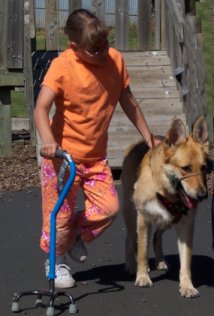 Unfortunately,
the demand for assistance dogs is so much greater than their supply that
too often the wait is five years or more. For anyone that is a long time,
but for a child it can seem like a lifetime. For months, as the family
waited and hoped, they kept their spirits up by joking that a service
dog for Cecily should be named 'Somebody' because often, when Cecily needed
help, she yelled, "Somebody, I need my cane" or "Somebody,
I dropped my crayon!"
Unfortunately,
the demand for assistance dogs is so much greater than their supply that
too often the wait is five years or more. For anyone that is a long time,
but for a child it can seem like a lifetime. For months, as the family
waited and hoped, they kept their spirits up by joking that a service
dog for Cecily should be named 'Somebody' because often, when Cecily needed
help, she yelled, "Somebody, I need my cane" or "Somebody,
I dropped my crayon!"
Fortunately for Cecily, a little over a year after she applied the good
news came. Tasha… a petite, gentle German Shepherd… who was
nearing the end of her training as a mobility assistance dog was deemed
by the Summit training staff as the quintessential 'child's dog'. In addition,
Tasha had proven herself able and willing to learn how to do the specific
tasks that Cecily needed. Needless to say, Cecily and her family were
overjoyed when they got the call about Tasha, even if her name was not
"Somebody"!
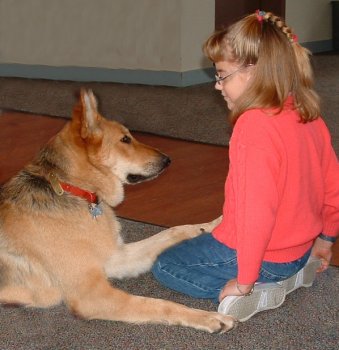 Hearing
that Tasha was available was only the beginning, however. Learning to
work with a service dog is a tough road to travel for anyone, but even
more so for a child. And for the parents, it always results in more work.
A dog is very much a child, forever, so adding 'another child' to a household
already dealing with the challenges of caring for a child with disabilities
is something that must be seriously contemplated. Cecily's family, however,
was willing to put in the extra effort and work in the hopes that Cecily's
life would be improved.
Hearing
that Tasha was available was only the beginning, however. Learning to
work with a service dog is a tough road to travel for anyone, but even
more so for a child. And for the parents, it always results in more work.
A dog is very much a child, forever, so adding 'another child' to a household
already dealing with the challenges of caring for a child with disabilities
is something that must be seriously contemplated. Cecily's family, however,
was willing to put in the extra effort and work in the hopes that Cecily's
life would be improved.
But challenges were there from the very first day of the training camp where Cecily would learn to work with Tasha. Tasha's trainer, Debbie Craig, remembers clearly what happened:
"I remember the first day of team training. Cecily walked in with her mother and grandmother, looking a little nervous. When we introduced her to Tasha, she hesitantly raised her hand to pet her. When we asked her to give Tasha a treat, she gagged as Tasha licked the treat away. The look of shock and dismay on her mom's face was apparent. They had been waiting so long for a dog, they were finally here, and now it seemed that Cecily may not be ready!"
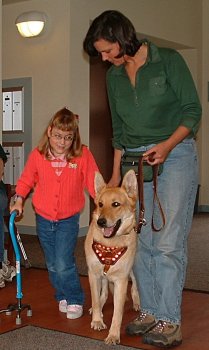 But
the next day things looked up: Cecily came in wearing her favorite cowboy
hat, just for Tasha. And she brought a present for Tasha as well: a blue,
stuffed dog. She put the little dog in Tasha's basket, and Tasha laid
her head on it.
But
the next day things looked up: Cecily came in wearing her favorite cowboy
hat, just for Tasha. And she brought a present for Tasha as well: a blue,
stuffed dog. She put the little dog in Tasha's basket, and Tasha laid
her head on it.
The relationship had begun.
Debbie Craig shares more:
"In their first week home, we received an email from Cecily's mom. She told me that for the first time in her life, Cecily went out to the back yard to play by herself, with Tasha. Tasha had provided that needed confidence."
Much more has happened since the serendipitous partnership of Cecily and Tasha. Much more that we hope to share here in the future. In my opinion, almost anything is possible when you put a dog and a child together. A recent report from Debbie truly personifies this:
"On my summer visit with Cecily and Tasha, Cecily's mom said we had to go to the park. Once there, I witnessed the most amazing thing. We went over to the slide. Cecily and Tasha went up the ramp. Tasha went down the slide, waited for Cecily to slide down, and then assisted her over to the ramp to do it again. Cecily's mom writes often to tell us of their blossoming relationship."
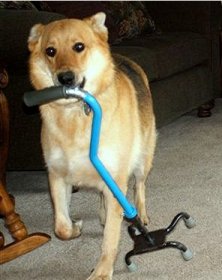 Cecily
finally has her best friend and the other children are clamoring for more
'Tasha time'. They are amazed, impressed, and even a bit jealous when
Tasha picks up Cecily's dropped crayon or brings her one of her crutches.
After all, who has such a beautiful, loving, and talented dog as their
best friend?
Cecily
finally has her best friend and the other children are clamoring for more
'Tasha time'. They are amazed, impressed, and even a bit jealous when
Tasha picks up Cecily's dropped crayon or brings her one of her crutches.
After all, who has such a beautiful, loving, and talented dog as their
best friend?
